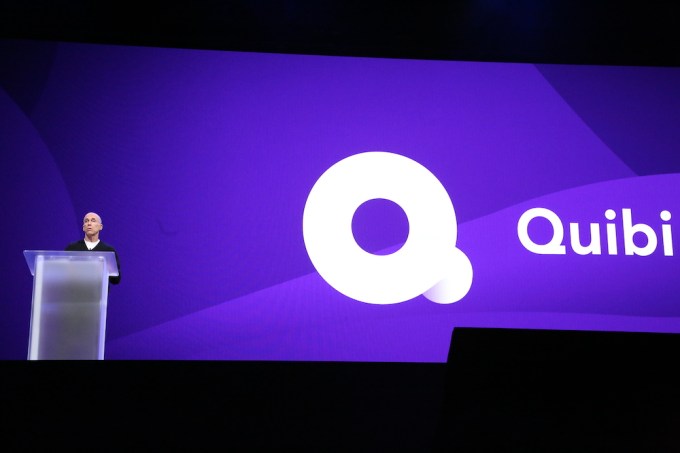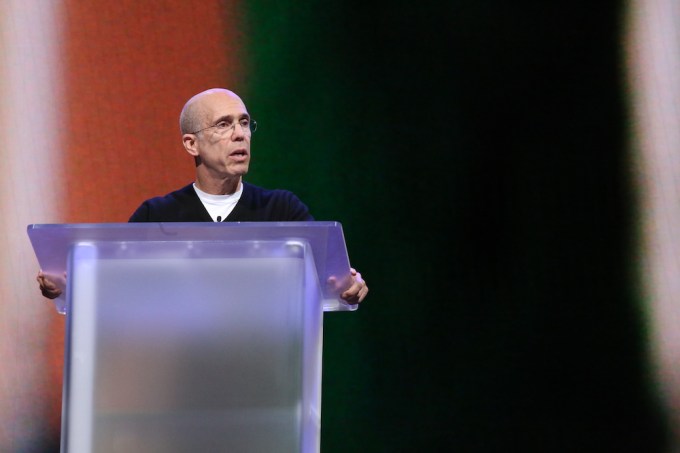Last week at the Consumer Electronics Show in Las Vegas, Quibi executives — including CEO Meg Whitman and founder/chairman Jeffrey Katzenberg — took the stage in a keynote laying out their vision for the mobile video service.
Katzenberg is a longtime Hollywood executive who led Walt Disney Studios during its animation renaissance in the late ’80s and early ’90s before co-founding Dreamworks Animation. Whitman worked at both Disney and Dreamworks, but she’s best known as the former CEO of eBay and Hewlett Packard Enterprise.
So it’s fitting that they presented Quibi as a company that exists at the intersection of Hollywood and Silicon Valley — as Whitman put it, creating “the very first entertainment technology platform optimized for mobile viewing.”
Before the keynote, Katzenberg and Whitman held briefings with individual publications, including TechCrunch.
The broad outlines of the service have been known for more than a year now, with a steady drumbeat of announcements of movies and shows from high-profile filmmakers like Steven Spielberg, Peter Farrelly, Guillermo del Toro and Catherine Hardwicke. However, this was our first chance to talk to Katzenberg and Whitman directly about their vision for Quibi.
In our interview, the pair explained why they see a need for new short-form video service and why they’re comfortable charging money for that content (The plan is to launch on April 6 with a price of $4.99 per month with adds or $7.99 without ads.) We also discussed their content plans, as well as Turnstyle, the company’s new technology that’s supposed to allow viewers to switch seamlessly between portrait and landscape video viewing.
You can read a transcript of our conversation below, edited and condensed for clarity.

TechCrunch: Why are you doing Quibi?
Jeffrey Katzenberg: Because it’s exciting. Because it’s challenging. Because it’s different from anything that anybody else is doing. It’s Mount Everest. You climb it because it’s there.
This is something I’ve thought about for a long, long, long time.
How long?
JK: Since 1999. I started a little company with Spielberg, Ron Howard and Brian Grazer called Pop.com. It lasted about 12 minutes. We were making short-form content.
This idea of movies in chapters — that this could be the next generation of storytelling that’s what — you know, I’ve been a storyteller my whole life. That’s the thing that got me the most excited … And I think that’s really the foundation of what we’re doing here at CES. I think what you’ll see is that every great innovation that has happened in Hollywood has actually been driven by a new technology.
Meg Whitman: When TV first started, it was people reading radio scripts looking at the camera. So at the beginning of a new technology, the creative looks very different from what it ultimately does. I think we were both excited about, could we take a new technology — the phone — and then create a creative platform that took advantage of everything the phone has to offer, and enables storytellers to create stories in new ways?
And do you feel the existing streaming services have not tapped into the phone’s capabilities?
MW: You know, only 10% of watching on most of the major streaming service is on the phone. It’s mostly on the TV. So very high quality, Hollywood production quality, has not really made it to the phone in a way you might have expected.
You’ll see our technology that we’ve created — full screen video, portrait-to-landscape, where you can seamlessly go back and forth. Today, if you hold your phone, [many videos are] just small, postage-stamp-sized videos. When you turn horizontally, there’s just big black lines.
And there’s some things you can only watch in portrait and some things you can only watch in landscape. We thought for our use case, which is on-the-go viewing — that period of time between 7 in the morning and 7 at night — you’ve got to be able to go seamlessly back and forth between portrait and landscape in full-screen video in an immersive way that makes viewing on mobile extraordinary.

How many shows do you have planned for year one of Quibi?
MW: 175. Remember, we’re not making the shows. We have no sound stage and actors. We commissioned the content from our studio partners.
What’s the release pattern for Quibi shows — is it like Netflix, where seasons are all dumped at once? And how long is a “season” on something like Quibi?
JK: There’s movies in chapters. There are unscripted shows — which are sort of episodic. And they’re everything from “Chrissy’s Court” [hosed by Chrissy Teigen] to Idris Ebla to a car competition show to Barkitecuture — a show about “cribs” for dogs.
They’re from the sublime to the ridiculous. Charming and funny. Inspiring and all that.
And I think the most fundamental foundation of Quibi is the curation of information. How do you take information which is ubiquitously available on that device in video today, professionally curate it, produce it at a very high quality, and deliver it in these very convenient five-minute packages?
So it’s three tiers of content. We will publish 30 original Quibis each day.
MW: Three hours of new content, fresh daily. If you think about network TV and how much they produce for primetime, it’s 35% more than network TV does Monday through Friday.
And we think people will come for the movies that we tell in chapters. Then they’ll stay for the daily essentials; that will create the daily consumption habit. We will launch with eight movies, and then a new movie will release every other Monday. And we’re not going to put it up all at once.
So if a show starts on Monday, and it’s 15 episodes, we’ll drop an episode every single weekday for three weeks. But it stacks as it goes. So if you show up on Wednesday, you can watch the first three episodes. If you show up on the last day, you could watch them all. We want to bring back a little bit of that watercooler effect.
Does the content expire and leave the service?
No, it becomes a part of the library. Well, the Daily Essentials will have a different library because it’s news. Tomorrow’s news won’t be very interesting [days later]. But all the movies stack and become a part of the library. And virtually all the episodic and documentary series stack and become part of the library.
So people could choose to wait to binge all episodes at once. Are you flexible in terms of this format?
MW: Before we launched, this is all about experience and judgment and what we think is the right thing to do is. The day after launch, all that becomes data … it’s a brand-new tech platform, and it’s been designed to spit up all the data we might need. And it will tell us, do people like the dropping one a day for 15 days, or do they want to have it up all at once? Do they likes the movies, the Daily Essentials, or do they like the episodic? That will inform us. Do they like the [user interface?]
We’re going to be super customer-focused.

Can you watch Quibi on your TV?
MW: Yes, you will be able to Chromecast it and to AirPlay it.
At launch?
MW: It will probably be a month or two after launch.
People are on their way home, they’re watching a show on their commute, then they get to their apartment and they want to see the end of it on their TV while they’re cooking dinner. But we think the vast majority of use will be on this [mobile] device.
Where does Quibi fit in, in the increasingly fractured and diverse streaming landscape among things like Netflix, Hulu, YouTube, etc?
MW: We think from a use case perspective, we don’t think we’re actually competing with any of the big [over-the-top] streaming services — Disney, Netflix, Warner, any of those — because [they’re] largely in your living room on your TV. If you’re gainfully employed, you’re not watching a lot of Netflix during the day, on your phone.
From a time perspective, we have to carve out more time to watch video — create a bigger category, watching video on your phone. It’s gone up dramatically. In 2012, it was six minutes a day. Last year, it was nearly 80 minutes a day. We think we can grow that category.
Do you think you’ll actually acquire some of the time people spend on social networks and YouTube?
MW: I think we will mostly grow the category. But I think we may acquire some time because we’re giving people a premium alternative.
We love YouTube. It’s amazing. It’s the most ubiquitous, democratized, incredibly creative platform, but they make content for hundreds of dollars of minutes, right? We make it $100,000 a minute. So it’s a whole different level. It’s movie quality. It’s Hollywood-quality content as opposed to user-generated content.
How are you choosing the talent you’re working with for Quibi? It seems like everyone in Hollywood is doing a Quibi show. Are you open to working with younger creators, like YouTube stars?
JK: Our door’s been open to anybody. We have no prejudice against that whatsoever.
But what we are making is Hollywood-type productions. So what we don’t want to do is simply make another YouTube show. You can’t just take that talent and now suddenly have them make it for Quibi. There are people who tried that, multiple ones that have tried that, and actually it really didn’t work out too well.
There are talent from YouTube who are working in doing our shows. Again, when you’re spending a couple of hundred dollars a minute versus $100,000 a minute, you’re not making a different version of the same content. You’re making a different type of storytelling.
To that end, if they’re good actors and good talent on YouTube, who can transition to that, we’re happy to have them. And by the way, we do. There’s a number of them that are actually working and doing things for us. But it’s highly differentiated.
Remember when HBO came along — early 1990s, remember their line was “It’s not TV, it’s HBO.” That was not a pejorative statement, putting TV down. We admire like crazy the entrepreneurial and creative talent that are on YouTube and Facebook Watch and IGTV and TikTok. It’s just different.
We’re just not doing what they’re doing. We’re not trying to do a high-end version of what they’re doing. We’re actually trying to bring the ecosystem of broadcast, cable, streaming television and television storytelling and bringing that to this world.
This is the third generation of film narrative. The first generation was movies — two-hour stories, to be in movie theaters. The second generation were TV shows that were 13- or 26-hour TV shows to be watched an hour at a time on a TV set.
Think of Quibi as two-hour movies that have episodes that are seven to 10 minutes in length, that are made native [for mobile]. What you’re about to see is this amazing new technology that allows it to be watched in a really, uniquely qualitative way.
Do you consider this initial slate of programming experimental?
JK: Everything up until April 6 [launch day] has been based on our instincts, our years of experience, and great talent that we’ve invited into contributing, authoring and making stuff for us.
On April 7, the customer speaks. We’ve designed our production capabilities, our partnerships with our suppliers, that when we see what is working, we will be able to very, very quickly pivot. If they want to watch comedy rather than scary, if they want drama, our ability to very quickly pivot to the content and the uses that we are seeing out of our customers is unlike anything anybody’s ever had before.
You know broadcast television puts a TV show on, and it takes 18 months to actually replace that show. You make a movie, it’s a year and a half thing. We actually have the ability to pivot within 60 days, 90 days.
































Comment